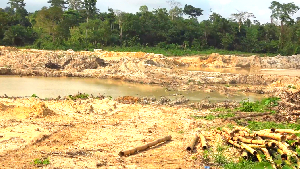Opinions of Friday, 2 April 2010
Columnist: Agyemang, Frank
Questioning the Status quo
“To bring about real change we must disturb the balance, our status quo.” –Robert Kegan and Lisa Laskow
Status quo is a Latin term which implies the current or existing state of affairs. To change the status quo means to stop doing things as being done presently or alter the existing state of affairs. Change per se is a situation that people are normally scared of because naturally we feel uneasy in dealing with uncertainties.
Logically we will all prefer to pursue the same path we are used to, be it individually, corporately or nationally because we feel confident and comfortable about the circumstances.
What sets great innovators or entrepreneurs apart from the rest of us is their ability to question the status quo. A research conducted on the World’s most successful entrepreneurs revealed that this class of persons is obsessed with questioning the status quo and suggesting radical changes, even when an existing product is generating healthy profits. They are often tinkerers and fearless about experimentation from a young age, and hold fast to their curiosity about new ideas in their professional life, whether at a cocktail party or a board meeting.
In my part of the world, talking of Ghana, it is culturally unacceptable to question the existing state of affairs especially in our communities. There are custodians of our long lasting culture ever ready to resist any move to make changes to situations one felt there is the need to, even at the peril of their lives. The usual respond is “this is how our forefathers did it and we must continue in that regard. The tradition must go on”.
A typical traditional challenge that readily comes to mind is the trokosi system. Trokosi is a form of slavery by which girls as young as six years old are given to a local priest as penance for a 'sin' committed by a relative. A ritual is performed signifying the girl is married to a god and then she becomes the shrine’s trokosi.
Although the girl has not committed any crime herself she cannot refuse to become a trokosi. She then is forced to have sex with the priest and bear his children and also has to work all day maintaining the shrine or working in the fields.
It took an NGO, IN NETWORK, formerly known as International Needs – Ghana, under the leadership of Walter Pimpong to begin to question the status quo and work directly with priests and local chiefs to effect the desirable change. This led to the release of 3,500 trokosi from 52 shrines. In changing the status quo, the NGO made the people aware that the practice was harmful and that there were other ways for people to atone for their ‘sins’, such as paying a fine with animals or money. However, it is estimated that this practice still affects up to 1,500 women and girls in the country. May be we need more Walter Pimpongs to gradually eliminate this unjustifiable tradition.
It is this traditional approach that denies us of the opportunities to redefine our values for our own growth and development. No wonder we are told to shut up even when grownups behave like recalcitrant children. Who are we to question them?
This is where I hold the same view as Ato Kwamina Dadzie of Joy Fm when it comes to our culture and democracy. We as a nation want to hypocritically behave as if democracy is our culture whereby the youths cannot question the status quo yet at the end of the day the youth will be expected to vote for better leadership. Is it then democratically wrong for us to question such leaders who do not perform to our expectations?
Unfortunately anybody fond of questioning the status quo is always regarded as a disrespectful or too known person by conservatives.
Moving away from culture and looking at the corporate world, it is difficult for employees to effect positive changes they believe could change the fortunes of the company more especially when top management has a long term defined system of working. Employee asking a tough question or proposing a new way of doing things may not be received well at a company. Most managers cannot stand the energy of a new employee trying to engineer a whole innovative process into the working environment. They are used to a system hence changing the status quo is like denying them their usual grounds of authority.
At the national level, unless a government is made up of people who are ready to question the status quo there will never be any significant change for the electorates to appreciate. Unfortunately under such a situation it is only the leadership who recognise the change hence they end up spending enough resources to talk about it. Do people need to be told that it is raining when indeed they can see and feel the rain? That only happens when it is not raining in their vicinity because even the blind and the deaf and dumb feel it when it rains. We cannot stick to the same old way of doing things and expect to have a different result. We will remain where we are until we begin to question the status quo. It is only through that that we can identify the improved, enhanced and better solution to our challenges at the individual, corporate and national level. This mentality can be a bit daunting to newcomers, especially if they come from an environment with entrenched and rigid processes; but, once they realise they have the freedom to explore new options and have the opportunity to be an instrument of change, they quickly adjust.
For us to see Ghana with a better future in about 20 to 30 years from now there is the need to build a capacity that is non-existence today and this is possible only if we begin to appreciate views and concerns that question the status quo. In the corporate world, it is the company that thrives on questioning the status quo that will remain relevant and survive the competition. Globalisation is fast outpacing local companies because most of the time these companies want to hold on to their old ways of doing business and not willing to go the extra mile by questioning the status quo and thereby depart from the norm. The time to begin to question the status quo is now.
Frank Agyemang.














